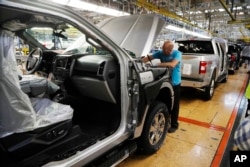The new North American free trade pact would modestly boost the U.S. economy, especially auto parts production, but may curb vehicle assembly and limit consumer choice in cars, a hotly anticipated analysis from the
U.S. International Trade Commission showed on Thursday.
The ITC report is a crucial step in the push for Congress to consider ratification of the U.S.-Mexico-Canada Agreement, which was signed by President Donald Trump and the leaders of the other two countries last year to replace the 25-year-old North American Free Trade Agreement.
The report estimates that annual U.S. real gross domestic product would increase by 0.35 percent, or $68.5 billion, on an annual basis compared with a NAFTA baseline, and would add 176,000 U.S. jobs, while raising U.S. exports.
The ITC's estimates are for year six of the trade deal, once it is fully implemented.
The trade deal's success or failure in Congress could be determined by how it is expected to affect the U.S. auto industry, a sector that steadily drained jobs to Mexico under NAFTA. The USMCA deal contains much tighter regional content rules, requiring that 75 percent of a vehicle's value be sourced in North America versus 62.5 percent currently, and 40 to 45
percent produced in high-wage areas, namely the United States
and Canada.
Auto industry employment would rise by 30,000 jobs for parts and engine production, but U.S. vehicle assembly would decline.
U.S. vehicle prices would rise up to 1.6 percent, causing consumption to fall by 140,000 units per year, or about 1.25 percent of 2017 sales, the report said.
The report overall was more positive than initially anticipated by economists, who said the traditional economic models used by the ITC to measure previous trade deals would result in minimal gains for the United States.
White House economic adviser Kevin Hassett told Reuters that he was pleasantly surprised by the results, which used different modeling methods that he called "accurate and well done."
"Their estimate is a lot closer to what we think USMCA will do than I expected," Hassett in a telephone interview. "This is very strong argument for passing the USMCA."
Concerns not alleviated
But some key Democrats were not swayed from their demands for improvements to the enforcement of new labor standards before they consider USMCA. Democrats control the U.S. House of Representatives.
Rep. Earl Blumenauer of Oregon, chairman of the House Ways and Means trade subcommittee, said that he had already believed the trade deal needed changes before it could be considered by the House. "Nothing in this report alleviates those concerns," he said.
Sen. Ron Wyden of Oregon, the top Democrat on the Senate Finance Committee said, "The administration shouldn't squander the opportunity to lock in real, enforceable labor standards in Mexico."
The ITC report said Mexican union wages would rise by 17.2 percent if the labor provisions agreed to in the USMCA were enforced. Even so, Mexican factory wages would remain far below those in the United States.
Republican Sen. Chuck Grassley of Iowa, chairman of the Senate Finance Committee, praised the report for highlighting benefits beyond tariff reductions.
"Many of the significant improvements in USMCA are reducing non-tariff barriers and implementing rules and fair practices that will help U.S. workers, jobs and businesses tremendously over the coming years," Grassley said in an emailed statement.
Dueling analyses
The U.S. trade representative's office had prepared a separate analysis of the USMCA's automotive benefits that industry officials had described as a rosier alternative view of USMCA aimed at limiting any potential damage from the ITC report.
USTR estimated that the trade deal would create 76,000 automotive sector jobs within five years as automakers invest $34 billion in new plants to comply with the regional content rules. The total includes about $15 billion in projects already announced.
USTR officials said their analysis was based on plans disclosed by automakers to the trade agency for compliance with the new agreement's tighter rules of origin.
"They have verbally committed to us that they intend to comply with the rules," a senior USTR official said. "And they have told us that this is not going to have significant upward pressure on vehicle prices."
But the ITC report said some automakers may decide not to offer vehicles that would be too expensive to bring into compliance with the deal, reducing consumer choice in the U.S. auto market.
The trade group representing Detroit automakers Ford, General Motors and Fiat Chrysler said it viewed the USTR analysis as more accurate than the ITC's.
The ITC "underestimates the longer-term investments and increased U.S. auto parts sourcing that will be made in our sector as a result of the certainty and predictability the USMCA will deliver," Matt Blunt, president of the American Automotive Policy Council, said in a statement.
The USMCA deal will also lead to new access for U.S. exports of dairy, poultry and egg products to Canada and U.S. imports of sugar and sugar-containing products from Canada, the ITC said.
The ITC's forecast estimated total U.S. dairy product output would increase by $226.8 million, or 0.1 percent. U.S. agriculture and food exports overall would increase by $435 million.







